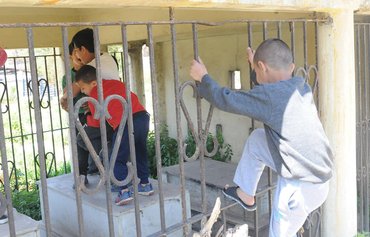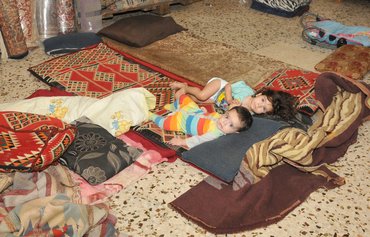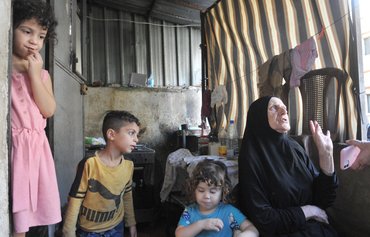BEIRUT -- Lebanese children and Syrian refugee children forced to leave school and work to support their families amid the economic crisis have become a common sight in the streets and shops of the capital and across the country.
Children can be seen working as street vendors and at vegetable stands, mini-markets, bakeries, carpentry workshops and automobile repair shops.
At an automobile repair shop in the municipality of Dora, to the east of Beirut, several Lebanese children are at work.
The oldest, Maroun Assaf, is barely a teenager.
![Teenage Syrian refugee Abdel Kader Al-Shami works in a tire shop in Sin al-Fil, Lebanon, after the economic crisis and his family's dire conditions forced to stop his education and take up a job. [Ziad Hatem/Al-Mashareq]](/cnmi_am/images/2023/07/12/42981-leb-child-labor-600_384.jpg)
Teenage Syrian refugee Abdel Kader Al-Shami works in a tire shop in Sin al-Fil, Lebanon, after the economic crisis and his family's dire conditions forced to stop his education and take up a job. [Ziad Hatem/Al-Mashareq]
![Waleed, a Lebanese teenager from the neighbourhood of al-Zarif, west of Beirut, was forced to quit school and work at a mini market to help his family. [Ziad Hatem/Al-Mashareq]](/cnmi_am/images/2023/07/12/42983-leb-unicef-600_384.jpg)
Waleed, a Lebanese teenager from the neighbourhood of al-Zarif, west of Beirut, was forced to quit school and work at a mini market to help his family. [Ziad Hatem/Al-Mashareq]
"We were a well-to-do family," 13-year-old Maroun told Al-Mashareq. "My sister, my brother and I went to a private school."
Last year, however, "the decrease in my father's income forced me to leave school to help him pay for household expenses, and my father had to transfer my brother and my sister to public school", he said.
Maroun's father, Youssef Akiki, is employed at a carpentry workshop.
His wages have decreased every week, he told Al-Mashareq, and he now struggles to buy bread.
"I was planning for a bright future for my children," he said.
"I was dreaming about them getting university degrees that would ensure their prosperous futures. But today, I have lost all my savings, and my salary isn't enough, and I had to send Maroun to work to help me in these black days."
Children's lives in Lebanon
In a report published June 20, the United Nations Children's Fund (UNICEF) notes that child labour is a result of the fallout of the ongoing economic crisis.
The report, based on an assessment conducted in April of 2,090 households with at least one child, says families are barely able to meet their most basic needs, even though they have cut down on essential expenses.
Almost nine in 10 households do not have enough money to buy essentials, forcing them to resort to desperate measures to cope, it says, and 15% of households have stopped their children's education, up from 10% a year ago.
According to the assessment, 52% of Lebanese households reduced spending on education, while three quarters (75%) reduced spending on health treatments.
Two in five households across the country have been forced to sell family possessions, up from one in five last year, it says.
More than one in 10 Lebanese families are now forced to send their children -- some as young as age 6 -- out to work as a way of coping, while more than one in four Syrian refugee families send their children out to work, the report says.
Many caregivers admit the desperate situation causes them to suffer persistent stress, resulting in feelings of anger towards their children, the report says. As a result, they often felt they wanted to shout at or hit their children.
Syrian refugee Hanadi Mohammed al-Shami said the stifling economic crisis has forced her to take her two teenage sons, age 14 and 15, and her 9-year-old daughter out of public school in Nabaa.
Her husband was not making enough money to feed the family from his job washing carpets, she told Al-Mashareq, and the family is not receiving any other form of assistance.
"My son Abdel Kader works in a tire shop and my daughter Alaa sells paper tissues and water bottles to passing cars, while my son Mohammed is looking for a job," she said.
Impact of economic crisis
UNICEF Lebanon told Al-Mashareq it has expanded its response programme in order to support the families who are most affected by the crisis.
The programme now includes, among other measures, "medical, psychological and primary health care, water services and education support", it said.
The UN agency has called on the Lebanese government to "invest in education through reforms and national policies to ensure all children, especially the most vulnerable children, have access to inclusive and quality education".
With the International Labour Organisation, UNICEF has helped with the development of Lebanon's National Social Protection Strategy "to respond to the multi-layered crises facing the country and to guide future reforms".
Many in Lebanon blame Hizbullah for miring the country in crisis, noting that its involvement with the Iranian regime has caused myriad problems.
The economic crisis "has changed family traditions and norms, causing the conditions of some families to deteriorate", psychotherapist Bahaa Yahia told Al-Mashareq.
"The impact of the crisis has been huge across the board, especially on children's education," she said.
"Families who were investing in their children's future by enrolling them in private schools can no longer afford even public schools," she said. "Many of them have been forced to work to support their families."
"This crisis has stolen childhood from our children."

![Teenage Syrian refugee Abdel Kader Al-Shami was forced to quit school and work in a tire shop in Sin al-Fil because of the stifling economic crisis in Lebanon. [Ziad Hatem/Al-Mashareq]](/cnmi_am/images/2023/07/12/42982-leb-labor-600_384.jpg)






